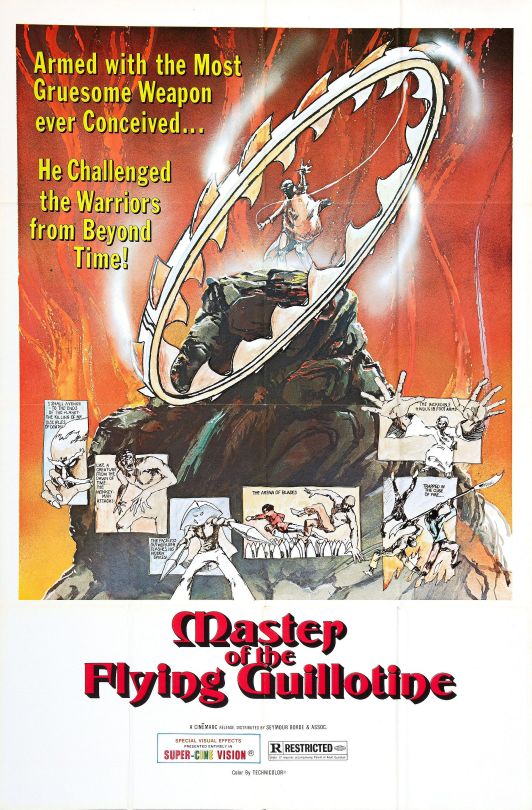#Master of The Flying Guillotine
Text



Dorytomus inaequalis, a weevil that i'm petitioning to give the common name Dhalsim Weevil
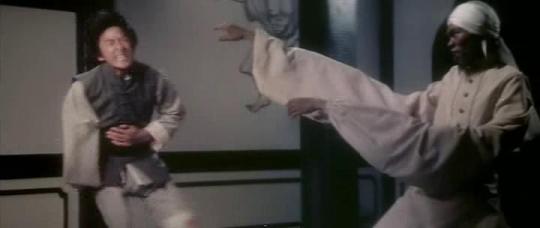
26 notes
·
View notes
Photo

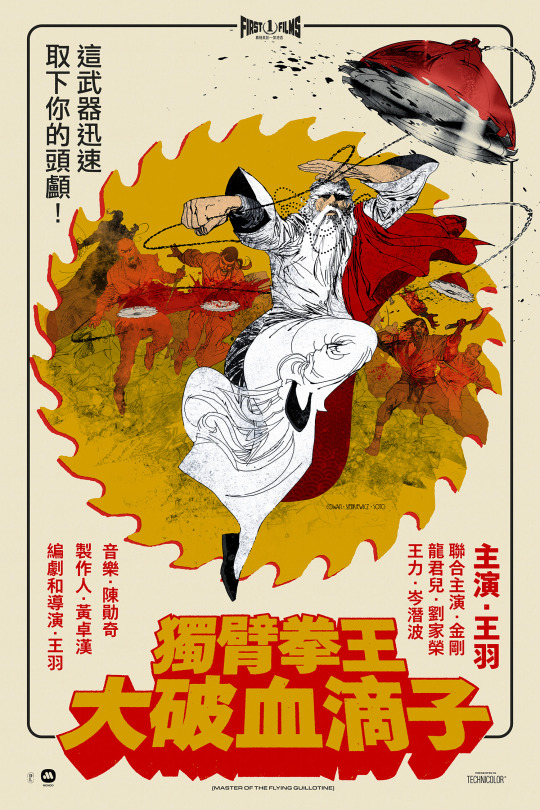
'Master Of The Flying Guillotine' by Denys Cowan (art) & Bill Sienkiewicz (inks) & Chris Sotomayor (colour).
Officially licensed 24" x 36" screen print, in a numbered Regular edition of 200 for $60, and a numbered Cantonese Variant edition of 100 for $80.
On sale Thursday June 16 at 11am CT through Mondo.
#Art#Master Of The Flying Guillotine#Denys Cowan#Bill Sienkiewicz#Chris Sotomayor#Mondo#poster#print#screenprint#Yu Wang
84 notes
·
View notes
Photo
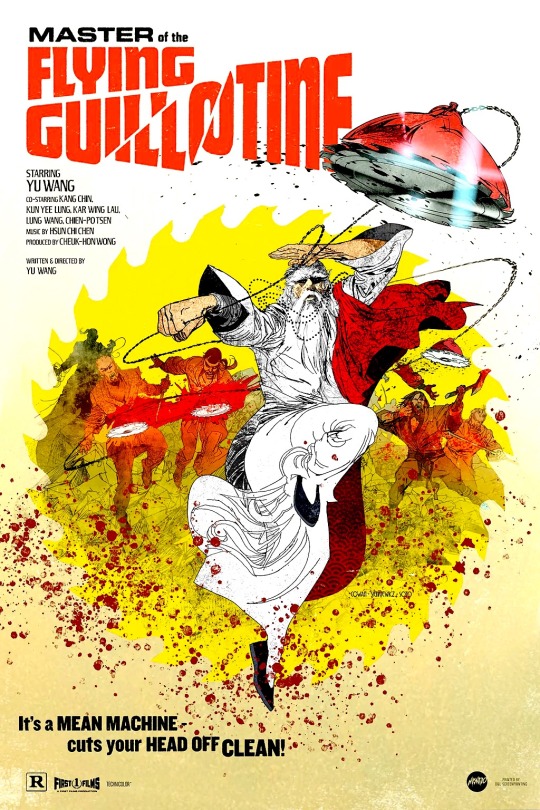
(via JHALAL DRUT: Master of the Flying Guillotine)
49 notes
·
View notes
Photo
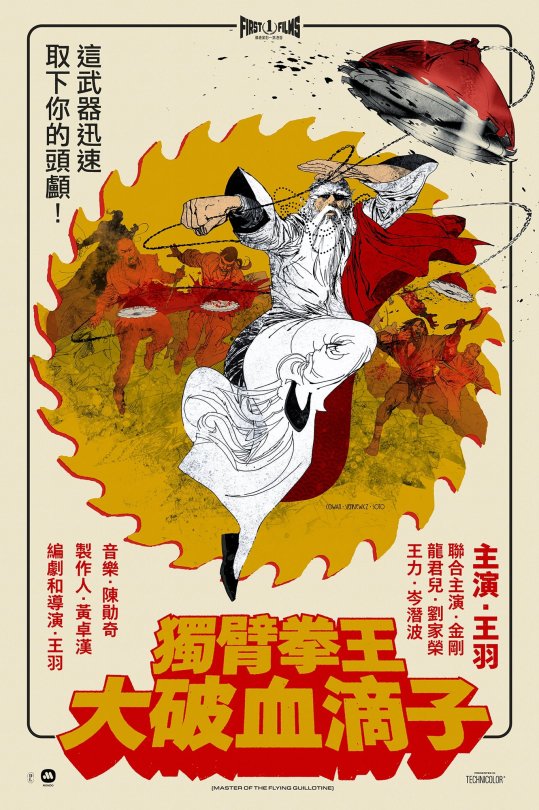
Master of the Flying Guillotine (1976)
Art by Denys Cowan and Bill Sienkiewicz
43 notes
·
View notes
Text
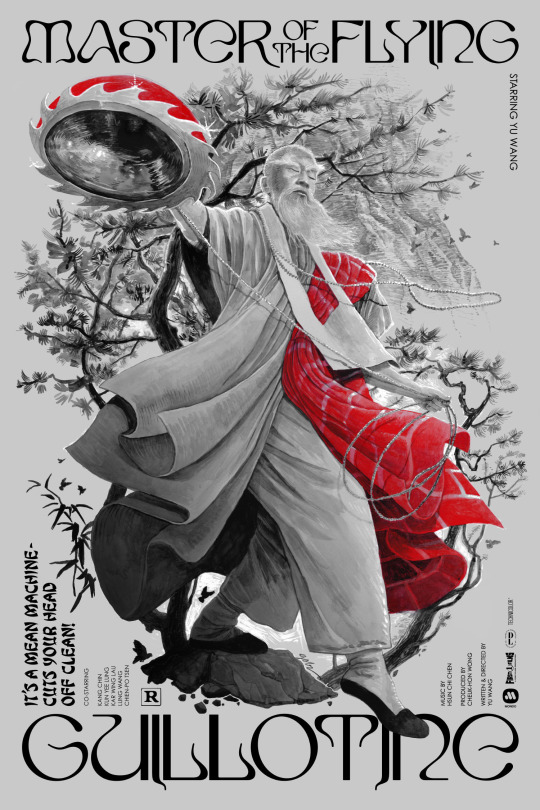
Master of the Flying Guillotine (1976) - Art by Gabz
10 notes
·
View notes
Photo
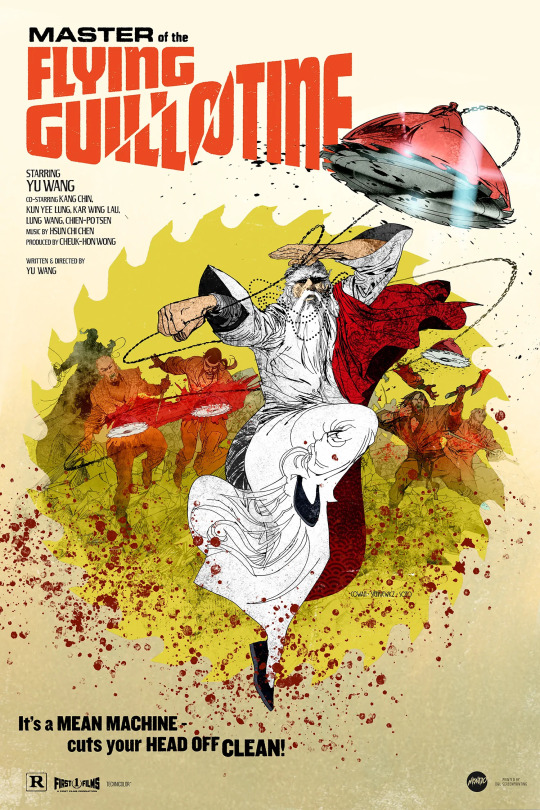
Mondo Master of the Flying Guillotine Poster by Bill Sienkiewicz
#bill sienkiewicz#mondo#posters#movie posters#master of the flying guillotine#martial arts#kung fu movies#movies
11 notes
·
View notes
Text

«1-5-81, Dayton - The Sherwood had a screen that had a couple of Kung Fu classics with SONNY CHIBA'S DRAGON PRINCESS and MASTER OF THE FLYING GUILLOTINE. On third was Fred Williamson in MEAN JOHNNY BURROWS.»
5 notes
·
View notes
Text


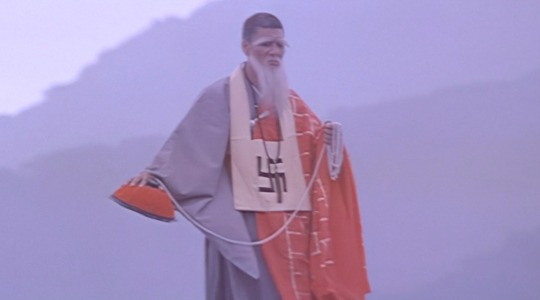
Liu Ti Lung the evil monk from Master of the Flying Guillotine (1976) might be one of my favorite movie monsters
51 notes
·
View notes
Text
The stuff dreams are made of, or the interesting case of Anthony J. Crowley
We’ve talked a bit about Crowley’s trauma and his way of reclaiming the narrative in the past, but it’s time for some deep dive into the story he’s trying to tell. A story that meanders through the fabric of time and space, slightly changing with the human fashion trends, but slowly and surely bringing the demon closer to a certain angel like the red thread of fate.
1793
Some stories start in a garden, some even Before the Beginning, but this one starts with an Arrangement. Or, to be precise, a little bit after that.
See, most of the iterations of Crowley we saw throughout the history until then didn’t delve too deep into human cultural tropes. If anything, they were the inspirations behind more or less prominent biblical figures, maybe some nameless villains matching his demonic provenance and role assigned to him by his employers.
But in the hustle and bustle of the revolutionary Paris, Crowley emerges as a prototype of the Scarlet Pimpernel — a chivalrous Englishman who rescues aristocrats before they are sent to the guillotine. Stan Lee famously called him “the first character who could be called a superhero”.
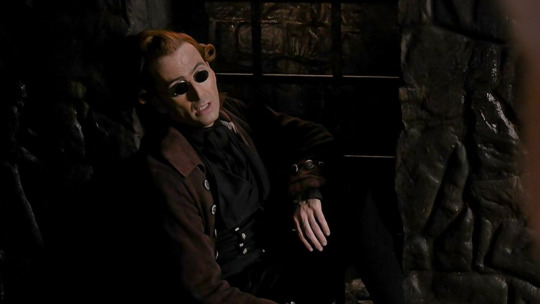
Sir Percy Blakeney, the main character of the novel and the West End play under the same title, leads a double life. Appearing as nothing more than a wealthy fop, in reality he’s a formidable swordsman, a quick-thinking master of disguise and an escape artist. Even his own wife, Marguerite, has no idea.
Unfortunately Marguerite is being blackmailed with her brother’s life to find and expose the wanted Pimpernel. She regrets betraying her husband the moment she's forced to do it and spends the rest of the plot working to save him. She does, they make up, and return together to England.

In Aziraphale and Crowley’s case there was just a short stop for crêpes. But what seems to be an inspiration of a specific scene might as well come up later in the wider perspective of the show, so keep in mind those fragments of the musical’s libretto:
We all are caught in the middle
of one long treacherous riddle.
Can I trust you?
Should you trust me too?...
We shamble on through this hell
taking on more secrets to sell
'til there comes a day
when we sell our souls away.
We seek him here, we seek him there,
Those Frenchies seek him everywhere!
Is he in heaven? Is he in hell?
Where is that damn elusive Pimpernel!
1941
The London Blitz is when we see a full-fledged iteration of the superhero Crowley performing dashing and heroic deeds under the literal cover of darkness and air bomb smoke. In a bespoke double-breasted suit and a fedora — still free from the unfortunate modern connotations from the internet culture — he’s clearly channeling Humphrey Bogart as a private investigator Sam Spade in The Maltese Falcon (1941) now.
It all starts with a woman and a simple plan gone wrong: Spade’s partner is shot dead, just like the man he was supposed to be tailing upon the request of a mysterious Miss Wonderly. And when a very soft-looking, sweet-scented man named Joel Cairo appears in his office willing to pay a hefty price for a "black figure of a bird", Spade starts not only a new job, but also his own quest for truth.
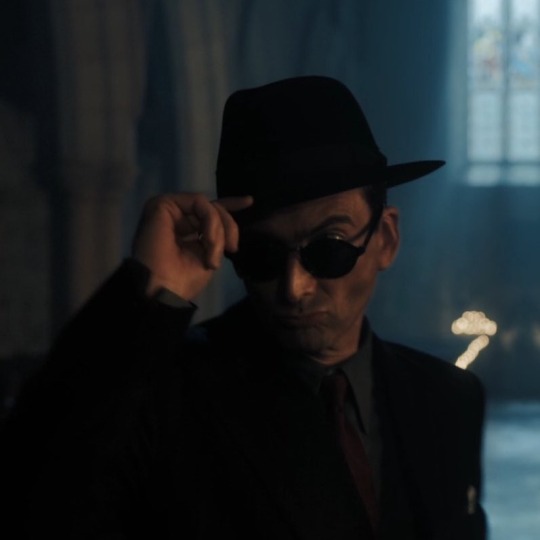
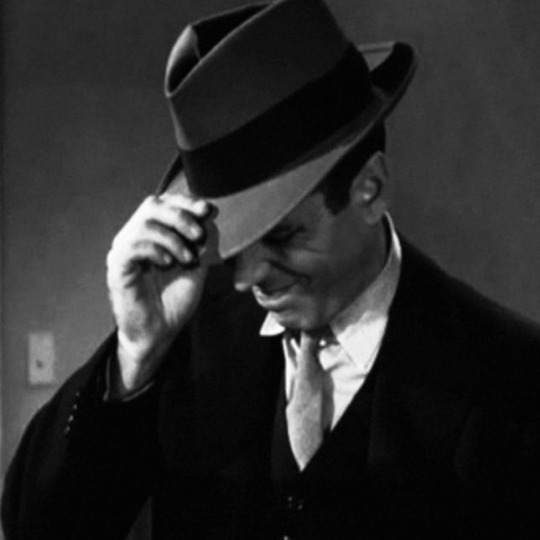
On the surface, The Maltese Falcon ends happily: the killer gets caught, and the hero winds up with the Falcon. But Spade's victory is completely hollow. The Falcon itself, originally meant as a symbol of loyalty, transforms into a symbol of a corrupting, futile, and self-destructive greed that makes people betray their own loyalties.
The treasure is just a worthless forgery and he’s fallen in love with the criminal — one of the first femmes fatales on screen. Despite his feelings for her and a kiss, Spade gives her up and submits the statuette as evidence, describing it as "the stuff that dreams are made of".
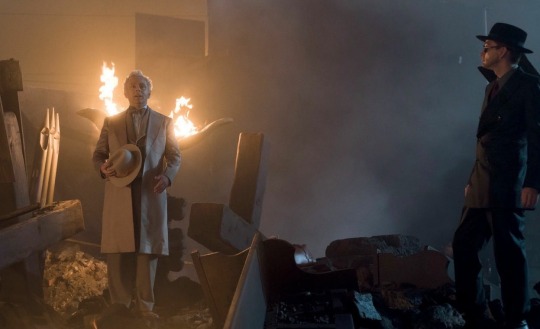
Remember the eagle lectern? The eagle was believed to be flying highest in the sky and therefore closest to heaven, symbolizing the carrying of the word of God to the four corners of the world. Aziraphale in the 1941 church scene is the closest to Heaven we’ve seen him on Earth. Just look at him: dressed in a smart, well-fitted coat with peaked lapels, symbolizing his Heavenly allegiance, and doing good this time not as a work assignment, but of his own accord. Being the closest to Heaven means the furthest and most unattainable for a demon like Crowley.
The Maltese Falcon is a metaphor for unattainability — things out of reach to desire and fight for, although never truly possess. It’s “the stuff that dreams are made of”. But Crowley secured the original — made of gold and encrusted with jewels, but hiding its real value under black enamel — eerily reminiscent of the demon himself and the unending kindness behind his inappropriately tight black clothing.
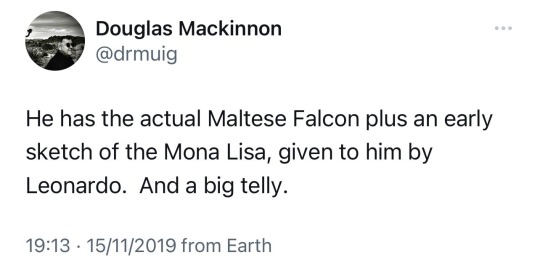
Quoting Michael Ralph — the production mastermind behind Good Omens — from the S01E04 “Saturday Morning Funtime” DVD commentary, “We wanted to tip our hat to the Maltese Falcon as being a precious object that no-one thought really exists but it does”. So we can safely assume that Crowley can and will achieve his dream in the future.
1967
Do you know what else happens in 1941 in Scotland? Ian Fleming, a British naval intelligence agent, meets with the famous occultist Aleister Crowley and asks him to lead the interrogation of newly imprisoned Rudolf Hess — a leading member of the Nazi Party in Nazi Germany appointed Deputy Führer — given the two men’s shared enthusiasm for the occult.
This meeting has a significant impact on Fleming’s work as a writer; Aleister Crowley becomes the inspiration for his first villain Le Chiffre and creates a blueprint for most of the James Bond’s franchise ever since 1953, the publication date of the novel Casino Royale.
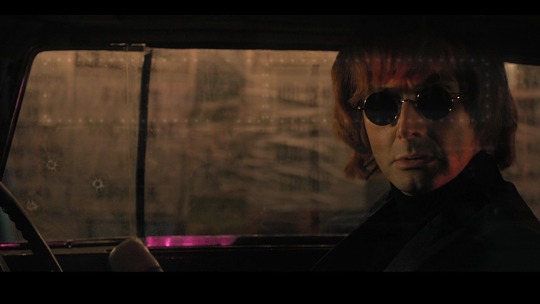
Meanwhile our Anthony J. Crowley believes in himself not being the villain he’s usually and sometimes forcefully painted as, but a superhero in disguise. The character of James Bond in particular inspires him so much that he buys petrol to get the limited You Only Live Twice (1967) window decals for his Bentley, dons his own tactical turtleneck, and sets off to organize a heist like no other. Sean Connery style.
Like a typical superhero, Crowley’s once again both saved and betrayed by his love interest. Aziraphale leaves him with a thermos of Holy Water, a faint smile, and a hope that they’ll soon match their speeds to meet halfway at the Ritz. The cancelled heist is not an ending, but a promise of a new beginning. And the fact that UK decriminalizes homosexual acts in the very same year is more than telling in this regard.
2019
An exceptional situation calls for exceptional solutions, and what’s more important than the impending Apocalypse? Demon Crowley does his best to put the arsenal of his 20th century film inspirations to good use.
"Ask yourself, do you feel lucky?" Crowley drawls, clearly imitating (although slightly misquoting) the titular Dirty Harry (1971). He’s hoping to be menacing and making the point of being the one on the right side of the law and history.
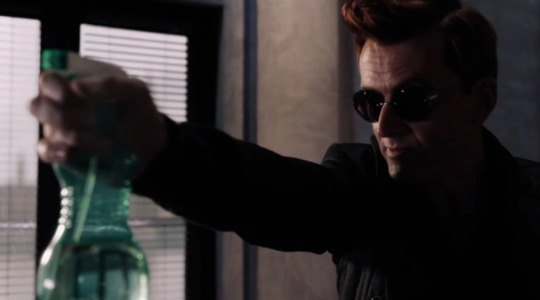
Some situations require more than quoting action heroes is not everything though. He knows what to do:
A jeep was heading purposefully towards the gate, and it looked as though it was crowded with people who were about to shout questions and fire guns and not worry about which order they did this in.
[Crowley] brightened up. This was more what you might call his area of competence.
He took his hands out of his pockets and he raised them like Bruce Lee and then he smiled like Lee Van Cleef.
'Ah,' he said, 'here comes transport.'
When in doubt, Crowley acts. He transforms into a combination of a stoic martial arts phenomenon and a sardonic, menacing character. His smile alone — even on Aziraphale’s angelic face, as seen in one of the final cut scenes — seems to be enough to ward off evil spirits, angels, and humans alike.
But we all know that even as breathtaking performances as those can’t protect anyone from the cogs of the Heavenly machine and its plans.
2023
No wonder that Crowley’s tactical turtleneck comes back in style after mere four years of retirement with a self-introduction “Former Demon, hated by Heaven, loathed by Hell. How will our hero cope?”. Something has changed during this time; he’s more mature now, not playing pretend by hiding behind the usual veneer of sarcasm and movie quotes anymore. Finally comfortable with the fact that this is his own story and there’s no need to become anyone else than himself.
The bookshop fire and the Heavenly trial still seem to haunt the demon in a way that makes him realize what all humans know: that every hero is his own biggest enemy. His ultimate dream might effortlessly change into his greatest nightmare any moment now, and the only thing he can do about it is hover in a two-minute distance from the epicenter of his feelings. But Crowley has no time to work on it when a new mission appears, to protect his angel from Gabriel and the combined powers of Heaven and Hell. Even if this — rather ostentatiously — is the last thing he wants to think about at the moment.
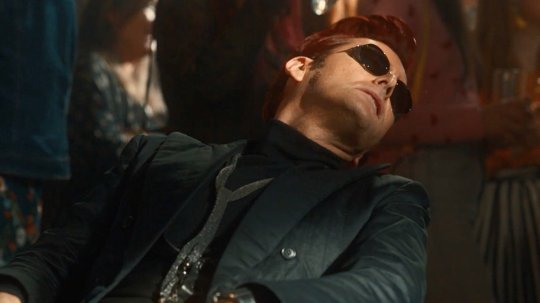
Crowley tries to plan ahead, while his story slowly warps into a different genre due to Aziraphale’s interruptions. He eventually changes back into his usual Henley shirt after agreeing to swap places and guarding the bookshop while the angel is off to Edinburgh, collecting more clues. Did he finish his personal quest off-screen? Did he just give up on it in the whirlwind of matchmaking shenanigans? Remains to be seen.
In the S2 finale our master of disguise in yet another turtleneck proves that he can successfully infiltrate even the universe’s back office. We don’t know where he drives off in the end, but one thing is certain — he’s got a plan. And a world (and his dream) to save, like a superhero he is.
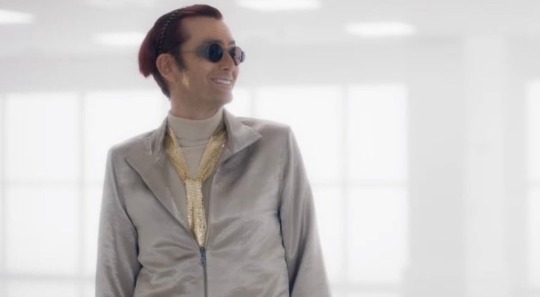
#a turtleneck kind of day#crowley is a superhero#and a master spy#with a plan#good omens#good omens 2#good omens meta#go2 meta#ineffable husbands#crowley#turtleneck crowley#yuri is doing her thing
113 notes
·
View notes
Text
Title: Something Borrowed.
Pairing: Yandere!Chrollo x Reader (+Hisoka).
Word Count: 1.5k.
TW: Implied Non//Con, Kidnapping, Psychological/Physical Abuse, and Manipulation.

The house was easy enough to find.
It was the only one for miles. A mansion, modern and well-maintained, tucked so far into the wilderness that the soft glow of the nearest city was barely visible in the distance. Chrollo lingered on the steps leading up to the main doorway, staring up at the flagstone archway before glancing down toward the note in his hand. Its contents were concise, almost charming in their simplicity; ‘borrowed something, pick up whenever, xoxo’, followed by a scrawled address and a familiar lipstick stain in place of a proper signature. He didn’t trust Hisoka, not like he trusted the other thieves, but if there was ever a place to be betrayed, this would serve well enough.
The door was unlocked, but he still took care to shoulder it open slowly, Bandit’s Secret tucked under his arm and his paranoia seeking out falling guillotine blades or lurking snares triggered by his entry. When no daggers or playing cards came flying towards his head, he proceeded onward, unsurprised and only a touch disappointed. Hisoka wasn’t the type to lay traps. His goal was to lure the object of his affection into his arena, to bring those he thought worthy of challenging him within arm’s length. Eliminating his suitors before they ever reached his den would only defeat the purpose.
The mansion’s interior was a suitable match to its outer face. The design was new-age, industrial, the color pallet limited to that of an oversaturated white and the rich brown of recently varnished mahogany. What little furniture there was had been thrown into a state of disarray – couches overturned, tables littered with empty wrappers and splayed magazines, broken glass sprayed across the floor and wine painted into everything that could hold a stain. He made his way through the chaos with a kind of voyeuristic revulsion, attempting not to linger on the heap of clothes discarded on the edge of the neon-lit pool, the spots of blood left splattered across a marble countertop.
On some misplaced instinct, he paused as he passed the door to one of many unremarkable storage closets – significant only in the fact that Chrollo, with his nen-honed senses, thought to stop next to it. With some reluctance, he twisted the knob and pulled the door open, finding the bodies of three men; one dressed in a cheap suit, the other two in bullet-proof vests, all donning identical slit throats and glassy eyes. They’d been killed that day, evidently. Sometime in the last few hours, if the wet blood still drying on their chests was any indication. He could imagine you, rooting through the wine cabinet only a breath away, blissfully unaware that you were standing next to such carnage. That was for the best. You’d never taken well to carnage, and he’d hate for such distress to be inflicted on you by any hands but his own.
With the first floor scouted, he proceeded to the second. He found you in the master bedroom, sprawled out on the center of a king-sized mattress, stripped bare save for the white sheet loosely wrapped around you. Another half-emptied champagne bottle sat precarious ly on the bedside table, and you looked as if you’d doused yourself in water and only just begun to dry – your hair still partially damp and clinging to your skin. One of your wrists had been handcuffed to the lowest bar of the headboard, a long red cord wrapped in a deceivingly intricate pattern over your chest, but you didn’t seem terribly concerned about your bondage. Granted, you probably weren’t in a state to be worried about much of anything.
It was a strange feeling. Not exactly anger, but a different sort of rage – tight and slippery and knotted, softened by his amusement but, in the same breath, complicated by his affection for you, his hesitance to see you used to fulfill someone else’s whims. He wanted to hurt Hisoka, to maim him so severely that he had only the strength left to beg for mercy. He wanted to shake his hand, to congratulate him on a game well played and offer him a reward that Chrollo, admittedly, hadn’t thought of yet. He wanted to bend at the waist and wretch until whatever was lodged in his throat had been pulled free. He wanted to drive a knife into your throat and drag until he hit—
The sound of approaching footsteps pulled him from his spiraling thoughts. His attention was drawn to the doorway of an adjoining bathroom, where Hisoka stood, a towel around his waist and a cloying smirk already playing at his lips. Unlike you, he was clearly still in a state of semi-coherency, his posture straight and his stare intent, as if he expected something more from Chrollo than what he’d already taken. “Finally,” he said, his tone airy and dripping with self-satisfaction. “I thought you’d decided not to join us.”
Chrollo didn’t respond, only watching as Hisoka came to sit on the edge of your mattress. His towel was allowed to fall away, his hand drifting to your cheek, where you nuzzled into his palm. On reflex, his gaze narrowed, Bandit’s Secret falling into the palm of his hand, but Hisoka only laughed. “Don’t get your panties in a twist. I’ve kept our little playdate strictly above the belt.” He let his head lull to the side. “Much to this one’s disappointment. You have to stop neglecting the poor thing – it was all I could do to stave them off.”
Another strange irk, this one more violent than the last. His lips parted, but before he could speak, your eyes were flickering open, your lips pulling into a sleep-addled grin as you saw Hisoka above you. “Is it time to…” You trailed off, fading into a yawn as your hazy attention drifted elsewhere, towards the foot of your bed. You almost seemed unable to process him for a long, idle moment before you collapsed back into reality – your expression snapping from one of confusion to utter horror, your unrestrained hand shooting upward to clutch at Hisoka’s shirt. “Chro— He’s—”
Hisoka cut you off. “I know, dear.”
“Why aren’t you—”
“Because I invited him.” He chose to put you out of your misery sooner rather than later, pulling away from you and pushing himself to his feet. “The more the merrier, right? I’m sure you wouldn’t have wanted Chrollo to feel left out.”
You looked at Hisoka like a kicked puppy, desperate to know why your master would be so cruel. A half-hearted attempt was made to sit up, but your arm caught your shackles, jerking you back down just as quickly. You cursed under your breath, groping frantically at the cuff, but whatever latch or lock you were looking for wasn’t within your reach. It was cute to see you scramble, though. “You— You promised you’d help me get away from him—”
“And I said I’d get you out of that stuffy little hotel room and help you have a little fun. You can’t hold me responsible for any assumptions you made about my intentions, sweetheart.” He found a seat on the other side of the bedroom, placing Chrollo between himself and you. “You got your fresh air, and I let you have your fun. Now, it’s time for your daddy to have his.” He looked towards Chrollo. “You are going to play with us, aren’t you?”
Chrollo would tear him apart, limb from limb, and keep him alive to watch his blood drain from his mutilated body. Chrollo would buy him a drink next time his Spiders met somewhere with a decent bar. “That depends on what you want me to do.”
With an airy chuckle, he sank back in his seat, what little rigidity he’d once had allowed to fall away with merely the suggestion of Chrollo’s complicity. “Like I said – it’s clear you’ve been neglecting the poor thing.” He paused, pressed his tongue against his teeth. “Show me what a good caretaker you can be, won’t you, dear?”
Chrollo was quiet for a long, slow moment.
Then, he brought a hand to his collar, and laughed.
It was cute – how wide your eyes went as he turned to face you; a caught rabbit backed into the furthest corner of its cage. Nails scratched against sheets, your lips parted in a silent plea to his remaining sympathy, but you’d done more than enough to earn your punishment. Hisoka would act as a witness; both to your misbehavior, and the corrective measures Chrollo was willing to take to make sure you didn’t do anything so idiotic again.
He watched your body go tense beneath him as he shifted onto the mattress, felt your frantic heart beating through your chest as he came to rest above you. He let his lips ghosts skirt over the corner of your lips, then your jaw, before falling to the crook of your neck. “I hope it was worth it,” he muttered, his voice nearly lost against your skin. He didn’t mind.
He had all the time in the world to burn your lesson into you, one way or another.
“Because you are never going to see the light of day again.”
#yandere#yandere x reader#yandere x you#yandere imagines#yandere oneshot#yandere scenarios#yandere hunter x hunter#hunter x hunter#hxh#hunter x hunter imagines#hxh imagines#yandere hxh#yandere chrollo#chrollo lucifer x reader#yandere chrollo lucilfer#yandere chrollo x reader#yanderecore#yancore
671 notes
·
View notes
Text

Teahouse Tales Analysis
Translations of the backstory (by Pascal): https://docs.google.com/document/d/1L_Lk5zmhuSHJMzS0ERV0jVHb-nWXgddwZJjT8oyJPmM/edit#
Translation of the event (by Pascal): https://docs.google.com/document/d/131Uuz69qVe6wJEOqnAx8LSWSdZyGUutg7kTd1zmNtUs/edit#
Teahouse Tales trailer: https://www.youtube.com/watch?v=a-_qrWTpzbs
Teahouse Tales was the 2nd anniversary event for the Chinese version of the game. The setting for this event is a teahouse run by the owner Lady Thirteen (Michiko). Besides going there to drink tea, secretly the main customers of this teahouse are those who have “committed” something. They come to this teahouse “without direction in life”, “at the end of their rope”, seeking “salvation” and “financial aid”. Lady Thirteen hears out what they have to say, and if she believes them, she may decide to help them. The reason they go to Lady Thirteen is because she controls the town’s “information lifeline” and there’s nothing “she doesn’t know” or “a person she can’t protect”.
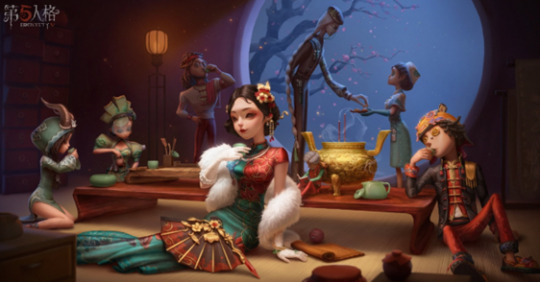
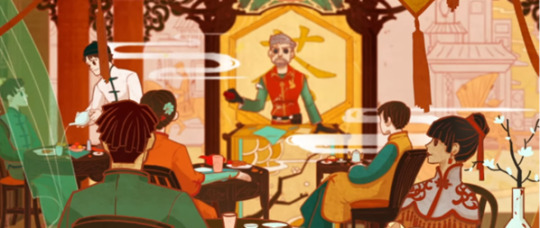
To support her she has her assistants Flying Guillotine (Wu Chang) and Sparrow (Norton). Flying Guillotine is a former famed assassin who now serves as her head waiter. He takes orders at the teahouse but also is in charge of “some of the boss’ more fearsome transactions” (meaning he likely kills for her when she needs it).
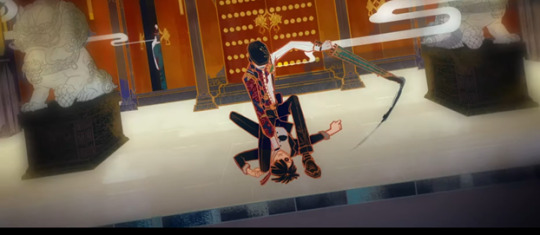
Sparrow is her second waiter. His role is to gather information and act as a “silver tongue” (based on the trailer), as he is “a master in the slick and sly, skilled in observation and indirect questioning, digging out and analyzing information amidst merrymaking”.

People go there to drink tea, but the teahouse also secretly gives aid to those who’ve committed crimes and come asking for help from Lady Thirteen. Lady Thirteen knows everything, as she controls the town’s information lifeline. Regarding her helpers, Flying Guillotine helps Lady Thirteen maintain order and eliminate potential problems, while Sparrow is in charge of gathering information. The player comes to the teahouse because they need her help with the photo album they have (of all their memories of the Manor). In return for helping with the photo album, Lady Thirteen asks the player to do a job for her: check gift boxes for poisonous gifts and help identify a traitor planning a “rebellion” against her.
One note about this event is that, depending on the choices you make during the event (based on the answers you give to questions you’re asked), you can get 1 of 2 endings: one where you side with Flying Guillotine, and the other where you side with Lady Thirteen.
After reading through the events and both endings several times, I believe there is for the most part only 1 timeline, with the events being given to us out of order and scattered about. The 2 endings aren’t mutually exclusive (Lady Thirteen’s ending occurs some time before Flying Guillotine’s ending). Each little bit of the event we get helps to fill a hole in the story we read in “Bone-Eating Gift”.
Bone-Eating Gift begins with Lady Thirteen having the player help her out by checking for poisonous gifts in return for assisting with their photo album. On Day 2, the player asks Lady Thirteen why she picked them to help her. She explains it’s because they are a “no-strings attached” outsider. They’re fresh, not familiar with anyone or anything at the teahouse, unbiased (at least for now), and only care about getting the photo album, thus making them the most suitable person to find the traitor for her. It also may be possible she has the player checking giftboxes as a way of testing the reaction of others at the teahouse (to further help her discover who the traitor is). The very next day, as a result of their talk with Lady Thirteen, it’s mentioned that the people at the Teahouse look at the player differently, while Sparrow and Jade Dew (Emily) notably keeping their distance from the player.
Day 4 has the player mention to Lady Thirteen that she should pay attention to Sparrow, because he’s been “acting odd” recently. This question makes Lady Thirteen unhappy, as she gives the player a “distasteful” look, before stating “He has remained by my side for a long time; He will not betray me”. The day after, the player is talking to Flying Guillotine who warns the player about Lady Thirteen and about how they should be careful about trusting her, before pointing out a window “at the child kneeling in the cold, wet snow”.
On Day 6, it’s mentioned today is Lady Thirteen’s birthday, and Sparrow thinks it’s a good day for lighting fireworks. The player asks if he’ll wish Lady Thirteen a happy birthday, but he says “No need, she just needs to know I’m here”.
The final day of Bone-Eating Gift brings up the fact Lady Thirteen is investigating Silver Steed (Freddy). She also gives the player their photo album before telling them “you and I both have what we want; and with this, you have my thanks”.
In the ending where you side with Flying Guillotine, we learn from Jade Dew about Flying Guillotine’s past, and why he wants revenge on Lady Thirteen. “The noble son of aristocrats studying abroad, who suffered until his family was broken and people had died. And every last part of it was because of Lady Thirteen; because of her ‘trade’”. Later, with the help of the player (they don’t really seem to directly help out. They just seem to support Flying Guillotine and not help Lady Thirteen) and Jade Dew, who gives Flying Guillotine a gun, Flying Guillotine kills Lady Thirteen.
In the ending where you side with Lady Thirteen, it starts with Bohea (Mike) asking Sparrow about where to put some goods, though they freeze when the player enters the room. Sparrow tells the player not to worry (about what he was doing), but when the player asks if they were doing some kind of business, he smiles and “put up a finger and shushed: ‘You must keep this private’”. After this (at this time, it’s said that the player is watching fireworks), it’s said that the player gets Sparrow in trouble: “I knew of business, but not how to do it, and I got discovered; Sparrow was punished for it”. The player feels guilty for getting him punished, but Sparrow tells them not to feel bad, “Lady Thirteen is my biggest benefactor. This job really is my responsibility, too” and says just to stand by their side next time.
Later, Sparrow tells the player not to sleep in “because of unnecessary questions” before saying they should go deliver refreshments to Lady Thirteen. Right after, he says “I believe she might be in danger” (the “Drops of water leaking from the roof ran down his neck” might actually be sweat, potentially to show he’s nervous). With Lady Thirteen, we find her with Silver Steed (Freddy), who’s apparently been beaten and dealt with harshly. Sparrow at this time is described as indifferent to him and what’s going on. Lady Thirteen says she’s trusted Silver Steed, but apparently he’s “gone and palmed off” Lady Thirteen’s goods, which is the reason for his current miserable state. She takes a stack of deeds from Sparrow, before saying to Silver Steed, “These are all your worldly possessions. Oh, not only that, but I just remembered. Your wife is newly pregnant, isn’t she?”. This apparently breaks Silver Steed and makes him freak out. He says he’ll talk, but before he finishes speaking, he’s shot and killed.
Now that I’ve summarized all of that, let me talk about what I think happened.
I’ll start with the beginning of Lady Thirteen’s ending, where the player finds Sparrow and Bohea talking about goods of some sort that Sparrows says is a “private” matter. Sparrow’s actions and behavior in this scene, especially since he doesn’t explain himself and he’s already been keeping his distance from the player, should be the reason why the player brings up to Lady Thirteen that Sparrow is acting “odd” and that she should keep an eye on him. The reason why they tell Lady Thirteen to be wary of him stems from Lady Thirteen assigning the player to help her identify the “traitor” at the teahouse.
Regarding the goods that Sparrow and Bohea had been handling, I believe these goods were for Lady Thirteen’s birthday. The reason why it was “private” is likely because he was trying to plan a party for her without her knowing. That’s why he didn’t want to tell the player what he was doing. It also fits considering soon after these events we hear about Lady Thirteen’s birthday. Things Unfortunately, things don’t go well for Sparrow and his plan after the player tells Lady Thirteen that Sparrow is suspicious, as this leads to him being “punished”.
Remember that one day mentioned a child kneeling out in the snow?
That was Sparrow.
Poor Sparrow is betrayed by the player and punished by Lady Thirteen all because he was trying to plan a surprise birthday party for Lady Thirteen.
This is likely why he tells the player he isn’t going to wish Lady Thirteen a happy birthday, and why her simply knowing he is here is good enough. He had just been punished by Lady Thirteen due to being suspected of being the traitor because of the player’s comments about him. We know Sparrow isn’t the traitor as he’s described as being completely loyal to Lady Thirteen. Lady Thirteen reflects these same feelings about Sparrow when she talks about him. Even though Lady Thirteen knows he would never betray her and that he isn’t the traitor, she is forced to punish him anyways to keep up appearances for the real traitor, to seem unbiased and on guard. Sparrow, because he is so loyal, accepts this and appears unbothered, with his only desire to help her out however he can. If Sparrow were to wish her happy birthday right after his punishment, it would ruin the image she’s trying to display to everyone and hinder her attempts to find the real traitor.
From her “distasteful” expression we know she was just as unhappy about having to punish him, but also aware that she now didn’t have a choice.
This scene explains the part when it says the player was “discovered” (aka they made a mistake) and Sparrow was punished. The mistake was the player suggesting that Sparrow was the traitor because they thought Sparrow was suspicious from whatever he was doing with the goods. The punishment was where we see Sparrow (the “child”) kneeling out in the cold ice and snow. Bohea was likely helping Sparrow out because he is the kind of person who wants to make people “smile” and “a rowdy crowd always makes him forget his fears”. Mike is a happy person who likes having fun, so it’s not surprising he'd be willing to help Sparrow plan a birthday party.
Switching now to Flying Guillotine’s ending, the beginning of this ending, where Flying Guillotine asks for the player’s help to get his revenge, occurs before Lady Thirteen’s birthday. One part I want to discuss is when Flying Guillotine says “Silver Steed has been discovered”. This comes after Lady Thirteen finishes her “speech” at her birthday celebration (and after Jade Dew gives Flying Guillotine a gun). Silver Steed being “discovered” should refer to the scene during lady Thirteen’s ending, where she kills Silver Steed for betraying her. This may refer to Silver Steed’s body being discovered from the Lady Thirteen ending, when he is killed for betraying her.
Silver Steed was also mentioned at the end of “Bone-eating Gift” on Day 7, which is the same scene Lady Thirteen gives the player the photo album and says “you and I both have what we want”. If Lady Thirteen has what she wants, this should refer to her goal of discovering the traitor, and relate to the “business” she is said to have with Silver Steed that day. Therefore, this implies that Bone-Eating Gift Day 7 happens before Lady Thirteen’s ending, after which is Flying Guillotine’s ending. This also implies the player didn’t leave immediately after getting the photo album, potentially staying at least long enough for the Lady Thirteen’s birthday.
So Silver Steed is killed before Lady Thirteen’s speech and before Flying Guillotine kills Lady Thirteen. If these 2 scenes happen near in time to each other, this could also mean that when Sparrow says he thinks Lady Thirteen is in “danger”, he’s sensing Flying Guillotine is getting reading to carry out his revenge and kill Lady Thirteen. This could also mean those “fireworks” were for Lady Thirteen’s party, and the “refreshments” he was brining to her were also from the party.
If Sparrow was at least in the previous scene when Silver Steed is killed, that means he is still alive and somewhere at the party. But the fact that we don’t hear about him at all afterwards, or anywhere in Flying Guillotine’s ending. I don’t think Flying Guillotine would’ve killed Sparrow. His only target was Lady Thirteen, the one he deemed guilty of killing his family, so he could fulfill his revenge. I don’t think he would’ve done anything to Sparrow once he accomplished what he wanted to do. But from there, we don’t really know what happens to Sparrow after Lady Thirteen is killed.
It's also possible, based on Silver Steed’s description (“What can compare? The gold clutched in your hand; is there anything more valuable?”) plus Freddy’s background that Silver Steed may have been involved if not mostly responsible for whatever led to Flying Guillotine’s family dying. It’s mentioned that Lady Thirteen’s “trade” is what caused it to happen. And if you compare this and the outcome to Freddy’s background, where he tricks Leo to buy a debt-ridden factory so he could take Martha from him and eliminate Leo (not to mention Leo and Martha both die, while Emma is orphaned), it fits really well with what happens to Lady Thirteen. Leo would be like Flying Guillotine’s family, regarding them getting a bad trade and getting killed as a result, with Flying Guillotine being similar to Emma since he, like Emma, is all alone now (Sparrow is similarly left all alone like Emma after Lady Thirteen is killed). Silver Steed being taken out by Lady Thirteen could relate to Freddy being taken out by Leo in the diaries.
From various bits during the event, I think Lady Thirteen may have known about Flying Guillotine and his desire to kill her for revenge. She likely knew why as well, which may have been part of the reason she had Silver Steed killed. She should’ve known about the “trade” that got his family killed, and if she finally learned that Silver Steed was the “traitor” that got them murdered, she likely wanted to eliminate him as a way to try to get revenge for Flying Guillotine’s family. Lady Thirteen is also continuously mentioned to know everything. Therefore, there’s a chance she knew Flying Guillotine was coming to kill her. She may have even let him do it. Maybe it was another way to make it up to him (help him end his suffering over his family’s death by letting him carry out his revenge).
During the “Sixth Tale”, it mentions Lady Thirteen has a photograph of everyone from the teahouse. The idea of a “family” is important to her. “On Lady Thirteen’s face hung a smile. ‘Not a single victory happens without relying on those by your side’”. Based on this, it’s possible that Lady Thirteen cared about Flying Guillotine as well, even though she likely knew he wanted her dead, and maybe that was part of the reason why she may have let him kill her (it depends on how involved she really was in his family’s death, and thus maybe she wanted to make up for her mistake).
To Lady Thirteen, the real “traitor” was likely Silver Steed, and she got what she wanted by killing him, but she likely also knew Flying Guillotine was the one who wanted to murder her for revenge. If she knew her death was coming, maybe she tried to send Sparrow away. Unfortunately, it’s probably more likely that Sparrow was around when she died, especially with how loyal he was to her and how much he cared about her. He may have even ended up having to watch his adopted mother get murdered right before his eyes.
I’m going to talk about Lady Thirteen a little bit.
In the backstory for Teahouse tales, it’s mentioned this teahouse is located in a Chinatown in Europe. This goes with Lady Thirteen’s skin description which describes her as a “foreign beauty”, referencing how Lady Thirteen isn’t from Europe. Her design notes also specifically refer to her as a “Far Eastern beauty”. This matches with her backstory, as we know she’s from Japan. Specifically, from her 1st deduction, her hometown was likely Eversleeping Town.
Michiko’s Deduction 1
Hometown: This is the last stop for our ancestors and the starting point for our journey.
A diary: Before entering, I called it Forever Sleep Town. Those moving objects really catch your eye on in those quiet, sleepy streets.
Sometime after this, 1 of her backstories from her release references she became the “best dancer in Yoshiwara”. Based on deduction 3 (and her backstory), we know she meets Miles at a banquet, after which they get married and he takes her back to his hometown. Considering Mr. Donnelly is at Lakeside, and Lakeside is near the manor, this likely confirms Miles’ hometown was in England. This fits with how the teahouse was stated to be in Europe and how Lady Thirteen is referred to as a foreigner.
Going back to the design notes for Lady Thirteen, it specifies that the purpose for her teahouse is for her own survival as well as to “protect those like her, her compatriots staying abroad, defenseless, while also collecting valuable information to exchange”. Lady Thirteen was far from home, all on her own, without any friends or support. She initially created this teahouse as a way to ensure she could make ends meet and ensure she could survive. But she began meeting others like her, who were potentially people also from the far east, and she sympathized with them due to her own circumstances. That’s when she decided to utilize the teahouse as a method to gather information, which she could use to help those that came to her for aid (meaning she likely used the info both for the sake of knowledge to help those wanting salvation, but also to improve her own finances which she could then give to those asking for financial help).
Due to being on her own in a foreign land from the far east, she had to become vicious to endure the foreign environment. This fits with her skin description, which talks about “the only way” to keep herself safe was by using other people: “For a beautiful woman who lived in a foreign country, perhaps the only way for her to keep herself safe... is to obtain sufficient leverage on people. Lady Thirteen always said, ‘Kindness alone withers the roses. Only the valuable nutrients will keep roses alive’”.
She wanted to ensure she wouldn’t get trampled upon by those who’d look down on her for who she was, and as a result of constantly socializing and working with people who aren’t always truthful or don’t always have the best intentions. As we see in her design notes, “in the world of Chinatown, no man dares overthrow her dynasty”. Lady Thirteen succeeded in building up her image as a “venomous woman, all snake fangs and scorpion’s sting”, “flirtatious”, “a manipulator, one who kills decisively”, “unyielding”, “clever and resourceful, ruthless, but never losing her kindness”. This allowed her “dynasty” to be protected for some amount of time.
Until Flying Guillotine starts planning his revenge.
If Lady Thirteen was killed due to Flying Guillotine wrongly believing she was the reason his entire family died, this could relate back to Michiko’s backstory. In her backstory, Miles’ father Mr. Donnelly really hates Michiko (similar to how Flying Guillotine really hates Lady Thirteen). After Miles has to leave for India on a business trip (he’s an army officer according to Michiko’s backstory), Mr. Donnely uses that chance to murder Michiko and then hide her body. When Miles returns, his father lies and insists that Michiko had eloped with a servant and stole some of the family’s property, though Miles doesn’t believe this. This can parallel the rumor that Lady Thirteen was the reason all of Flying Guillotine’s family had died.
Speaking of Lady Thirteen being killed, I want to briefly discuss the snake hairpin that she has in her hair in the Teahouse Tales poster.

The reason I want to draw attention to it comes from how this same hairpin can be seen during the Teahouse Tales trailer alongside Flying Guillotine.

The hairpin appearing next to Flying Guillotine while talking about a “conspiracy” to “end an era” is meant to further represent how Flying Guillotine is the one starting a “rebellion” and planning to assassinate Lady Thirteen.
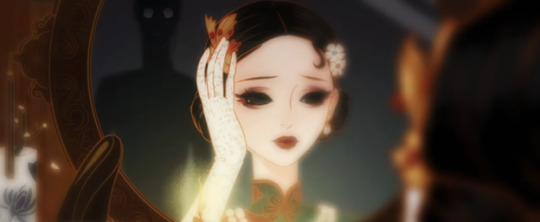
We know Flying Guillotine was indeed forming a “rebellion” based on the various mentions of all those he is likely working. The first and most obvious is Jade Dew from his ending, who is literally the one to give him the gun and comments “looks like the plan was a success” with a “cheery smile”. Then there’s potentially Silver Steed (even though he may have been the one actually responsible for Flying Guillotine’s family dying, it’s possible Flying Guillotine didn’t know this, and it’s possible Silver Steed intended to betray him later) and Lantsang, who Flying Guillotine tells the player to find for him and let her know “Silver Steed has been discovered”.
This hairpin being used to symbolize her being killed also parallels Michiko’s backstory. Specifically, it fits with her deduction 5, which mentions a “hatpin”, which was likely the object Mr. Donnelly used to kill Michiko after Miles had left for India.
Michiko’s Deduction 5
Feelings: This is a completely different kingdom. The women wear exaggerated hats.
Buckle Hatpin: A delicate butterfly hatpin. It is 6 inches long and has a very sharp tip.
This seems to be confirmed by her deduction 9, which once again references the hatpin at the same time as mentioning a “grudge” and how “he must know”.
Michiko’s Deduction 9
Grudge: Unrequited love, endless complaints.
A diary: He really doesn't know anything? No, that hatpin... he must know. He has to know.
On to comparing Sparrow to Norton.
A one-word summary about Sparrow is that he is a good boy that’s completely loyal to Lady Thirteen.
Yes, Sparrow does watch Lady Thirteen kill people and isn’t bothered by it, but for the most part otherwise, he is a good kid. At the very least, Sparrow never kills anyone himself, and everything he does is for Lady Thirteen. Yes, she’s said to be ruthless, but it also mentions during the “Second Tale” (from the anecdotes or “Tales Proven” according to the translation) that she is still capable of mercy: “A beauty who kills decisively and ruthlessly, but in her hidden depths one catches a glimpse of rare mercy”. Therefore I don’t think she’s completely evil, which is backed up by her design notes which state: “ever and resourceful, ruthless but never losing her kindness, in the eyes of the people, she had long surpassed such descriptors as good and evil”. As such, I don’t think Sparrow would be completely evil either for following her. In any case, Sparrow being a good boy could parallel how Norton really is, despite how he seems in his deductions. At the very least, it could be referring to how he used to be before his parents died and/or before he went to the 13 mines. He, like Sparrow, never directly killed anyone, though his actions (or lack of action in the case of Sparrow at the teahouse) due lead to people dying.
Sparrow is also described as loyal. This can combine with how he’s described in that “Second Tale” I mentioned earlier: “Sparrow may be a master of cunning, but to those he cherishes, he is sincere and pure”. To me, that sounds like Norton is the kind of person who has a small, but close-knit group of friends (kind of like the ones introverts have) vs. other people who are more the type to have large groups of friends. Him being sincere and pure to those he cares about can also be a mirror for Norton and how he is. We might be able to see this with Ronald and Inference in Golden Rose Theater. Ronald, like Norton and how he acts in his official tweet responses, isn’t the type to really form relationships. He is mostly a loner that pushes people away when they try to get too close, and tends to avoid social interactions whenever he can. But Ronald apparently does see Inference as a friend (and he is mentioned to really trust the Detective and describes him as one of the only 2 “good” people in his mind).
There’s also the strong bond between Sparrow and Lady Thirteen. This could be a hint towards how Norton felt about his parents before they died. That may also maybe explain why he is so extreme in his deductions and acts the way he does, because losing them hurt him so badly. Just like how much it likely hurt for Sparrow when he found Lady Thirteen dead, and just like Ronald felt when he had to deal with the death of his father.
The fact Sparrow and Ronald both lose a parental figure may help imply Norton himself lost his parents at an early age. The fact Lady Thirteen and Ronald’s father were both betrayed and essentially murdered, and it was by someone they were close to, could hint towards what happened to Norton’s parents. Someone close to them, that they trusted, betrayed them and got them killed. The only person we know related to Norton’s parents is Benny. If Benny is essentially represented by Scrooge in Golden Theater and Marshall in Season 10 Essence 1 (the essence with Andrew’s Desolate Sands skin, specifically based on the description for Gold Digger in the Chinese version), not to mention what we know about Benny and his strong desire of “returning to the mine” to find gold, it could be a way of hinting that Benny caused Norton’s parents to get killed for a reason related to that and/or to his greed.
Sparrow is constantly described as being smart: with how he constantly watches the player (being on guard until he finds out more about them, and/or just making sure to watch out for Lady Thirteen to guarantee the player doesn’t do anything to harm her), how he’s described as having “day-to-day sharpness and slick wit”, being called a “master of cunning”, being the one in charge of gathering information, etc… This links to Norton being quite smart himself. It’s related to his willingness to learn, his desire to improve his skill and ability, eagerness to learn new techniques, etc… That was why in the letters of recommendation he’s mentioned to not stay with any one employer or place for very long. He’s getting different experiences, so he’d learn more things and be better at his job (and at mining). Then there’s also how he had to be incredibly smart and talented to be able to utilize magnetic prospecting after Norton changed from being a miner to a geological prospector (after getting the meteorite chunks which he made into his magnets)
The fact Sparrow looks innocent and childlike, but in fact uses this advantage to gather information (make people drop their guard with him, get them willing to talk to him or talk more than they would otherwise) is similar to how Ronald in the Golden Rose Theater gathers information as well (to use against Scrooge so he can get revenge and also so he can become the owner). This relates to how Norton is a good actor. He’s good at pretending, getting people to see him a certain way, and good at hiding his true intentions and how he’s really like (someone who doesn’t like social interaction or making relationships, a loner, someone desperate to change his fate, etc…). The character relations page even references this when it talks about how Norton trying to gather information from the old miners in hospice and how he managed to swindle Benny of the list of 13 mines.
Finally, there’s also how Sparrow is described as “listless” during the scene Lady Thirteen kills Silver Steed.
Listless means: having or showing little or no interest in anything; languid; spiritless; indifferent. I think this may be a good description for how Norton normally is, especially if you think about some of the tweet responses he gives that are a bit darker than his other, happier ones. It could also relate to how Norton is after the accident. He was traumatized by the entire thing, to the point he desperately wants to avoid the “darkness of the mine” and changes his job to geological prospector just to keep from having to go back into the mines. He’s guilty over the deaths of the miners (which his Soul Catcher skin hints at, as well as how in at least 1 of his tweet responses he mentions “don’t forget” in regards to the Golden Cave), which is why he’s somewhat self-destructive (the fact he smiles when you down him in game, meaning he seems to be happy about possibly dying or suffering). Basically, the accident really changed him, leaving him in a state you could describe as “spiritless” or “indifferent”.
These descriptions can apply to Norton in general too. He essentially doesn’t really care about anyone, which also relates to how he pushes people away, avoids social interactions, and is pretty much “indifferent” and shows “no interest” in a lot of things, except for himself and changing his fate.
To go to Sparrow’s skin description, it states how he’s never been shown kindness. This sounds similar to what we see in the Famitsu article. This article talks about how, before Norton went to the 13 mines, people were intimidated by him and how hard he worked to escape his fate. Then it goes into how, after the accident, people didn’t comfort him and actually avoided him, despite how he was currently in the hospital recovering from the injuries he received as result of the accident. Then there’s how Norton is a miner. They were treated horribly back in those days (essentially just like slaves) and working conditions were incredibly bad (there was a really high chance of dying on the job, and owners didn’t care about spending money on protections, health, or safety). Not to mention they were pretty much paid next to nothing, so Norton, especially since his parents had died and left him alone, was really poor. Basically, Norton has lived a tough life just like Sparrow.
About the other parts of the skin description, Sparrow having to blend into the adults’ world relates to Norton having to grow up (and mature) quickly after his parents died. With them gone (and at an early age too), he had to learn to take care of himself. He had to get a job to get food and some shelter, and as a miner he also had to deal with horrible conditions, a horrible environment, and horrible people. And all of this he had to do on his own.
Regarding Sparrow learning to disguise himself, this goes back to Norton (and Ronald) being “actors”. They pretend. They act a certain way around people and they don’t really show their true selves (not to mention they keep people away mostly, while Ronald literally wears a mask). Based on Sparrow’s description, learning to disguise himself seems to have been necessary for his survival (the same way Lady Thirteen had to according to her design notes), so its likely that Norton had to learn to do the same for the same reason.
Moving on to another thing I want to take note of, for Sparrow’s skin, I want to mention how his magnets actually have a message written on them.

The left one is “smooth sailing”. This is an idiom that means “to have a pleasant journey”.
The right one is “may you invite fortune and become more and more treasure”. This is another idiom that means “we wish you success and riches”.
Both are the sorts of things Sparrow would wish for himself (and for Lady Thirteen).
For the first one about “smooth sailing”, this relates to one of his deductions that talks about not being unlucky forever. Smooth sailing can also relate to Norton’s goal, to change his fate and have a more “pleasant journey” than the one he currently has. Pleasant meaning he doesn’t need to work at a job where he’s paid extremely little despite working so much, where he has to risk his life everyday surrounded by people who only care about themselves, and working for employers who only care about money and not at all for their employees. A journey where he doesn’t need to worry about whether he’ll live to see tomorrow or have enough food on his table.
For the second idiom that says “may you invite fortune and become more and more treasure”, this obviously relates to what Norton wants, meaning his desire to change his fate and acquire wealth. It could also specifically relate to how the 13th mine is his last hope and to his wish to find gold there.
Another note about Sparrow’s lion hat is that (in Chinese) it might be a symbol for driving away evil or bad energy/spirits, famines, and plagues. Basically, it protects people and things from threats and harm (or from spiritual influences), and may also bring good fortune.
A symbol for driving away evil (spirits) could relate to Norton and him being affected by the meteorite. The good fortune bit again relates to Norton’s desire to change his fate and acquire wealth. For Sparrow, this might mean he’s hoping to protect Lady Thirteen, kind of like how in that one part of Lady Thirteen’s ending he comments on Lady Thirteen being in danger. This could also mean that Norton is good at noticing things and has good instincts.
The very last thing I’ll point out to go with Sparrow being loyal to Lady Thirteen is how we can see in one of the posters for the event that Norton signed his name on a contract (of sale I think?).

This could be the scene when Sparrow first joined Lady Thirteen. It could be a way for Sparrow to prove his loyalty. It may also relate to how Lady Thirteen essentially adopted Sparrow (after she found him, whenever that was).
#idv#identity v#Teahouse Tales#norton campbell#prospector#michiko#geisha#wu chang#idv norton#identity v norton#idv michiko#identity v michiko#idv wu chang#identity v wu chang#idv prospector#identity v prospector#idv geisha#identity v geisha#sirenjose analyses and theories
92 notes
·
View notes
Text
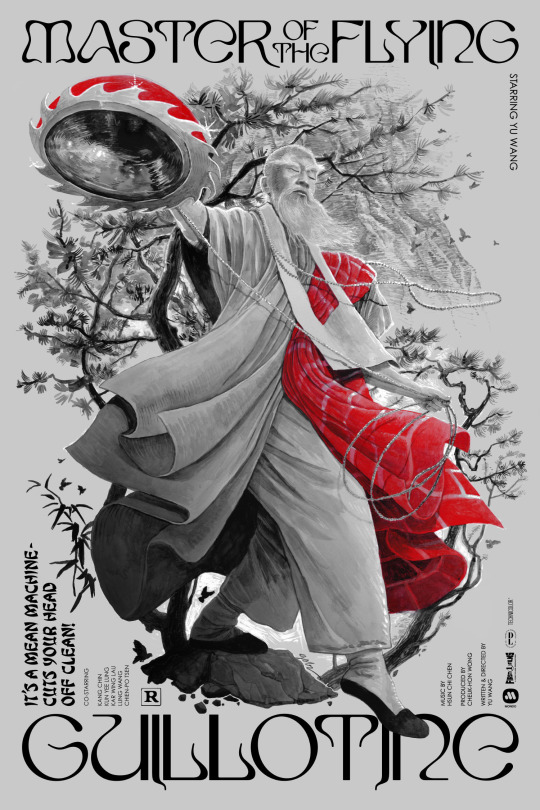
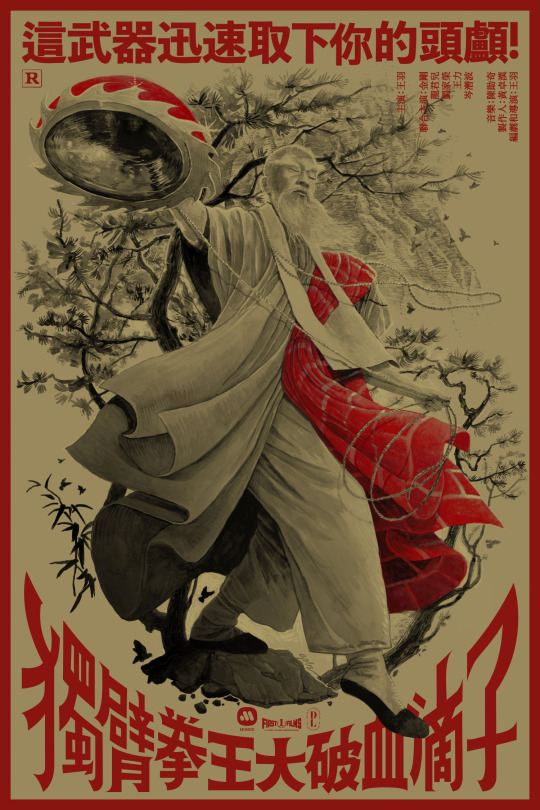
'Master Of The Flying Guillotine' by Grzegorz Domaradzki.
Officially licensed 24" x 36" screen print, in a numbered Regular edition of 215 for $60; and a numbered Variant edition of 140 for $80.
On sale Thursday February 9 at 11am CT through Mondo.
13 notes
·
View notes
Text

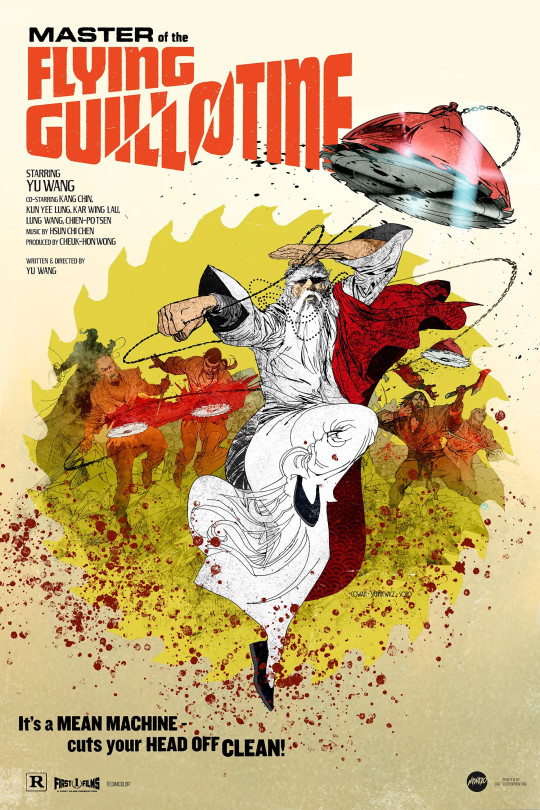
Master of the Flying Guillotine (1976) Mondo poster By Denys Cowan, Bill Sienkiewicz, and Chris Sotomayor
75 notes
·
View notes
Text
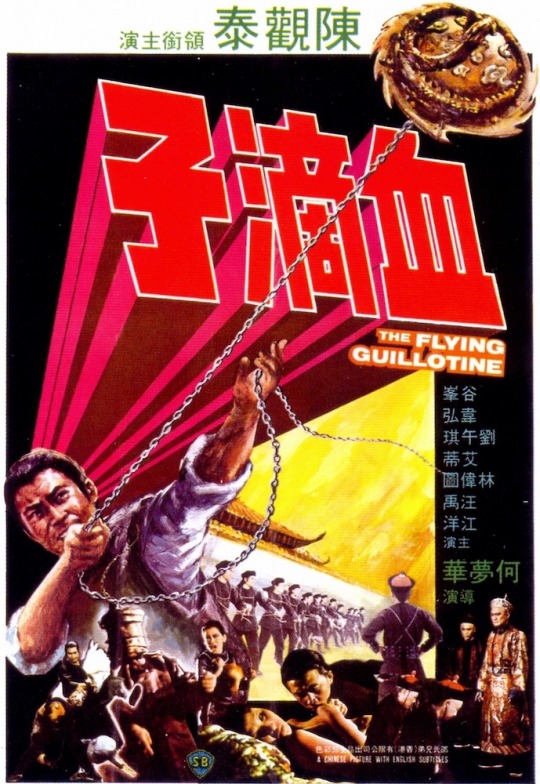
Master of the Flying Guillotine (Jimmy Wang Yu, 1976)
77 notes
·
View notes
Text


MASTER OF THE FLYING GUILLOTINE - Artwork by Denys Cowan, Bill Sienkiewicz, and Chris Sotomayor
#denys cowan#bill sienkiewicz#chris sotomayor#MASTER OF THE FLYING GUILLOTINE#art#illustration#poster art#mondo
17 notes
·
View notes
